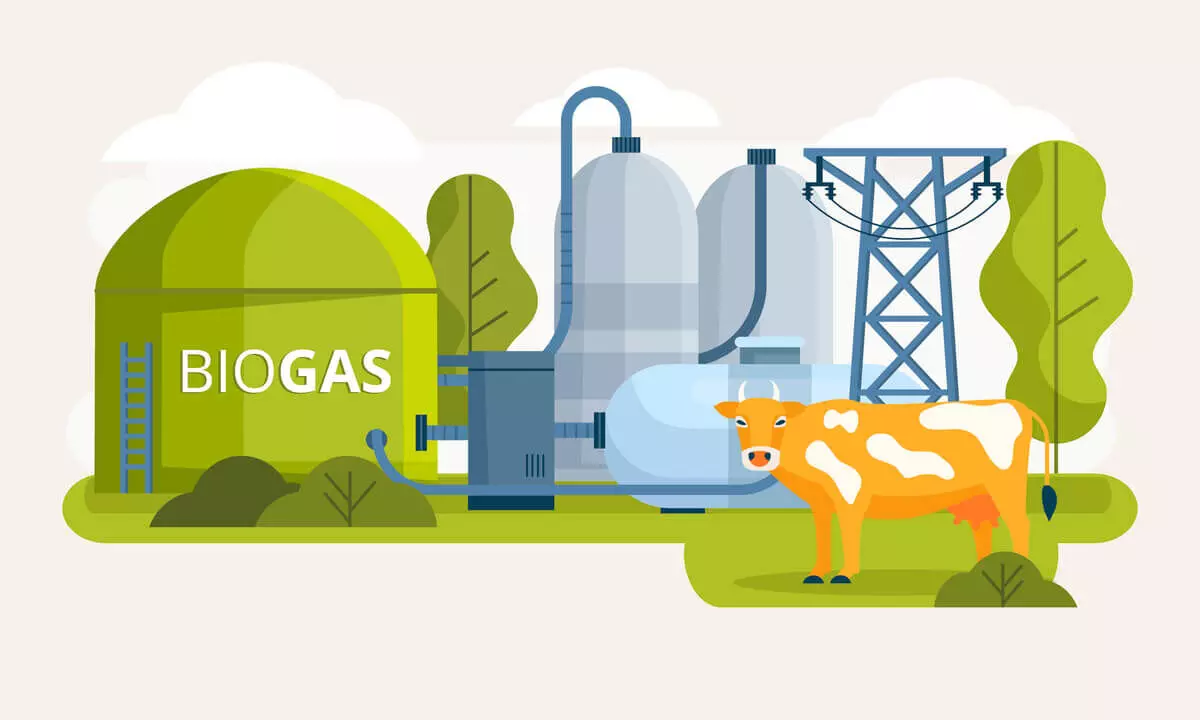Push for biogas as clean fuel of the future

India has just stepped up to the plate in terms of setting up and meeting ambitious goals to help cool the warming planet.
India has just stepped up to the plate in terms of setting up and meeting ambitious goals to help cool the warming planet.
Ahead of the COP28 summit starting from November 30 in Dubai, India announced it will start blending compressed biogas
(CBG) with natural gas (CNG). The mandatory blending will start at 1% for use in automobiles and households from April 2025. The blending will then be spiked to around 5% by 2028. India also aims to have 1 per cent sustainable aviation fuel (SAF) in aircraft turbine fuel by 2027, doubling to 2% in 2028. This measure has a great potential to boost rural economy. It is also essential to achieve clean energy transition along with sustainable socio-economic development.
Biogas is the methane created when anaerobic digestion (by certain bacteria that survive and grow without oxygen) breaks down organic matter, in landfills or “digesters” that convert animal manure or food waste, which can then be used to replace natural gas. Using this methane as a fuel dramatically reduces its climate impact by converting it into CO2, which is up to 34 times less potent as a greenhouse gas. CBG also referred to as bio-CNG could be directly used in vehicles that usually use CNG – it has calorific value and other properties similar to CNG’s.
India has 424 GW power generation capacity and non-fossil fuels account for around 180 GW. Biomass fuels “recycle” atmospheric carbon, and can reduce global warming impacts. Scientists term it reliable, cost-effective and environmentally sustainable. Recognising the vast potential of cattle dung, biomass, and urban and industrial biowaste for energy recovery, under the Panchamrit plan, India seeks at least half of its energy requirements via renewable energy by 2030, reduce CO2 emissions by 1 billion tonnes by 2030, bring carbon intensity below 45 per cent by 2030, and finally pave the way for the Net Zero emissions by 2070. CO2 emissions in India are estimated to be 2.9 GtCO2 this year.
The country has an installed about 10.7 GW biopower, including 10,314.6 MW grid-interactive and 218.1 MW off-grid power. In August, Punjab started commercial production of CBG at a plant at Bhuttan Kalan in Sangrur district. It is Asia’s largest compressed biogas plant with 33.23 tonnes per day capacity.
Big corporates are now coming forward to tap the new sunrise sector. It is heartening to learn that National Biofuels Coordination Committee anticipates substantial investments up to Rs 37,500 crore and the establishment of 750 CBG projects by 2028-29. According to the GOBARdhan portal, 1,137 CBG plants are either operating or are under construction. Reliance Industries has said it would set up 100 CBG plants in the next five years. These plants would consume 5.5 million tonnes of agri-residue and organic waste. Indian Oil Corporation (IOCL) also announced setting up CBG joint ventures.
Despite the paradox of having to continue, or even increase, fossil fuel-based power capacity, India has, nevertheless, committed to expanding its renewable energy sector to transition towards a gas-based economy. Now, it needs to lead by example and push other members at COP28 to take to biogas as fuel of the future, as resources are immense in every country – to benefit local economies and save on cost of fossil fuel imports. As the planet warms up, wreaking extreme weather events in forms of wildfires, glacial outbursts, cyclones, flash floods etc., humanity’s very survival depends on clean energy adoption. Biofuels comprising biogas, ethanol and biodiesel aid energy security as well as rural uplift.














